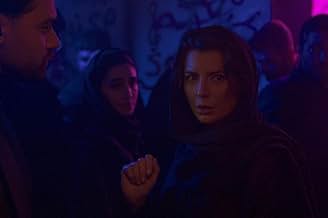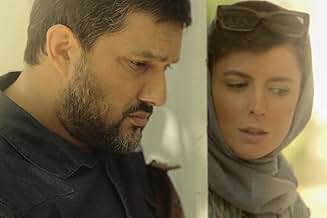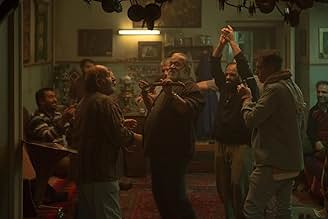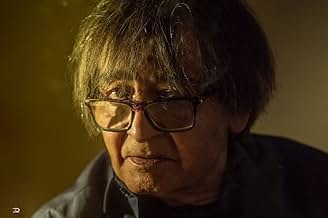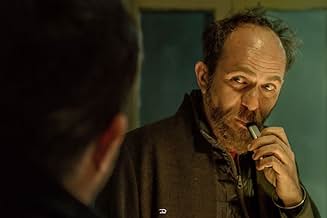Pir Pesar
- 2024
- 3 h 12 min
AVALIAÇÃO DA IMDb
8,0/10
1,6 mil
SUA AVALIAÇÃO
Adicionar um enredo no seu idiomaTwo Iranian brothers live with their abusive father. When he rents to a young woman planning to marry her, her attraction to the older son creates tension in their already fractured family.Two Iranian brothers live with their abusive father. When he rents to a young woman planning to marry her, her attraction to the older son creates tension in their already fractured family.Two Iranian brothers live with their abusive father. When he rents to a young woman planning to marry her, her attraction to the older son creates tension in their already fractured family.
- Prêmios
- 3 vitórias e 1 indicação no total
Avaliações em destaque
The film was shocking and at the same time fascinating, a 3-hour film that no one left the theater during the screening! The story progressed well for the first hour, and when it reached the second hour, it became a little boring. I think this film could have been much more interesting at 2 and a half hours. The last 30 minutes of the film are when the story reaches its darkest point, and several horrible secrets are revealed and those shocking events occur that are like a bucket of ice water being poured on the viewer. Despite being still in shock, the viewer looks at the last frame, which is full of longing, tragedy, and blood, and that music and the dirty, messy house, which now has negative energy lurking in every corner, and the film ends.
When I watched the movie, felt the same as the time when I was reading Brothers Karamazov. They show how family becomes a microcosm of society's larger moral and existential struggles. At heart, both The Old Bachelor and The Brothers Karamazov are about:The inheritance of sin and guilt across generations. Men trapped between obedience, rebellion, and longing for redemption. The dangers of unchecked power, whether paternal, social, or internal.
Oktay Baraheniseems to have intentionally borrowed not just themes but also stylistic techniques from Dostoevsky, particularly The Brothers Karamazov, the house in the movie send you back to the Fyodor's house.
Oktay Baraheniseems to have intentionally borrowed not just themes but also stylistic techniques from Dostoevsky, particularly The Brothers Karamazov, the house in the movie send you back to the Fyodor's house.
The Old Bachelor," directed by Oktay Barahani, was for me more than just a typical drama. With Hassan Pourshirazi's outstanding performance as Gholam Bastani, the film skillfully portrays the archetype of the "Puer Aeternus" or "Eternal Youth." This character, despite his age, remains emotionally stunted, refusing to embrace the responsibilities of adulthood.
This interpretation is reinforced by Gholam's own pivotal dialogue: "A man whose life has no rules or order, even if he grows old, will remain an old boy and never truly grow up!" Furthermore, one can observe echoes of "Dionysus," the god of ecstasy and liberation, within Gholam Bastani, which perfectly complements the "Eternal Youth" aspect of his character. This is a profound and thought-provoking film that delves into the psychological layers of humanity.
This interpretation is reinforced by Gholam's own pivotal dialogue: "A man whose life has no rules or order, even if he grows old, will remain an old boy and never truly grow up!" Furthermore, one can observe echoes of "Dionysus," the god of ecstasy and liberation, within Gholam Bastani, which perfectly complements the "Eternal Youth" aspect of his character. This is a profound and thought-provoking film that delves into the psychological layers of humanity.
Well, where do I even begin? I just left the theater a few hours ago, and I'm still in shock. The movie starts off intriguingly, skillfully introducing each character. You immediately get a strong sense of everyone's personality and background, which makes it easy to connect with them on a deeper level.
The direction was stunning, and the cinematography was breathtaking. But what truly stood out was the acting. The entire cast-Qolam (Hassan Pourshirazi), Ali (Hamed Behdad), Reza (Mohammad Valizadegan), and Raana (Leila Hatami)-delivered performances that were nothing short of exceptional. Hassan Pourshirazi's portrayal of Qolam was particularly profound; it felt like the character and actor were one and the same. His performance ranks among the most realistic and deeply moving in recent Iranian cinema.
I've noticed some negative reviews, which I believe stem from the film challenging deeply rooted taboos in Iranian society. This film bravely confronts a taboo rarely addressed in Iranian cinema: the unquestioned respect for parents, especially fathers, regardless of their behavior. I'm not saying fathers shouldn't be respected, but only if they truly fulfill the role of a father-that is, someone a child can rely on and trust.
In many countries, organizations exist to support children with abusive parents or women facing abuse from older men-another taboo topic this film highlights. But in Iran, a father can legally inflict severe harm on his children, sometimes even lethal, with minimal consequences. This film powerfully depicts how a father's destructive behavior can ruin his children's lives, leaving them powerless to stand up against him.
Some critics argue that if this movie were made in Hollywood, it wouldn't have the same impact. But films must be judged within the cultural and social context in which they were made. It's telling that the film was completed four years ago but only released recently-no doubt due to government censorship cutting many scenes. Iranian filmmakers don't enjoy the creative freedom their Western counterparts do.
Taking all this into account, this film is a masterpiece that held me captive from start to finish. The last 30 minutes had me on the edge of my seat, and when the credits rolled, I was so overwhelmed I couldn't move for several minutes. This is a must-watch film that sheds light on how children can become victims of their parents, how young women can suffer at the hands of older men, and how society itself can fail its youth.
A truly brilliant film with outstanding performances.
The direction was stunning, and the cinematography was breathtaking. But what truly stood out was the acting. The entire cast-Qolam (Hassan Pourshirazi), Ali (Hamed Behdad), Reza (Mohammad Valizadegan), and Raana (Leila Hatami)-delivered performances that were nothing short of exceptional. Hassan Pourshirazi's portrayal of Qolam was particularly profound; it felt like the character and actor were one and the same. His performance ranks among the most realistic and deeply moving in recent Iranian cinema.
I've noticed some negative reviews, which I believe stem from the film challenging deeply rooted taboos in Iranian society. This film bravely confronts a taboo rarely addressed in Iranian cinema: the unquestioned respect for parents, especially fathers, regardless of their behavior. I'm not saying fathers shouldn't be respected, but only if they truly fulfill the role of a father-that is, someone a child can rely on and trust.
In many countries, organizations exist to support children with abusive parents or women facing abuse from older men-another taboo topic this film highlights. But in Iran, a father can legally inflict severe harm on his children, sometimes even lethal, with minimal consequences. This film powerfully depicts how a father's destructive behavior can ruin his children's lives, leaving them powerless to stand up against him.
Some critics argue that if this movie were made in Hollywood, it wouldn't have the same impact. But films must be judged within the cultural and social context in which they were made. It's telling that the film was completed four years ago but only released recently-no doubt due to government censorship cutting many scenes. Iranian filmmakers don't enjoy the creative freedom their Western counterparts do.
Taking all this into account, this film is a masterpiece that held me captive from start to finish. The last 30 minutes had me on the edge of my seat, and when the credits rolled, I was so overwhelmed I couldn't move for several minutes. This is a must-watch film that sheds light on how children can become victims of their parents, how young women can suffer at the hands of older men, and how society itself can fail its youth.
A truly brilliant film with outstanding performances.
Loneliness and the struggle to maintain a relationship are concepts that are intensely highlighted in Pirpesar (The Old Bachelor). Oktay Baraheni's film, with a deep and dramatic gaze into a patriarchal Iranian family, attempts to depict the psychological and social complexities of its members. In this family, where the father's authoritarian dominance overshadows all relationships, the characters grapple not only with external pressures but also with their own internal conflicts. Baraheni skillfully portrays the clash between two generations and two opposing mindsets-one firmly rooted in old traditions and the other striving for change and an independent identity in the modern world. Beneath these generational conflicts, the despair and struggle to preserve family bonds under harsh circumstances are vividly portrayed, where every movement and word of the characters seem to echo an internal battle for peace and balance in a male-dominated world.
The father, played masterfully by Hassan Pourshirazi, is the embodiment of a patriarchal system whose dominance extends beyond the social sphere into the psychological and emotional realms of his family. While maintaining an outward display of authority, this tyrannical father wrestles with internal crises and contradictions, which the film gradually unveils. His character reveals that those who appear powerful on the surface may be plagued by deep psychological wounds and struggles. Though he controls his family with absolute authority, he represents an older generation whose dominance seems unshakable. However, the screenplay skillfully dismantles this authority, gradually passing the power down to the next generation-his children.
And then there is Hamed Behdad-an actor who, with his exceptional command of body language and dialogue, precisely conveys the shadow of patriarchal oppression hanging over the next generation. His character struggles to overcome his father's authoritarian rule, and through his outstanding performance, free of any unnecessary dialogue or exaggeration, he captures the profound emotional turmoil of his character with just his gaze. His eyes become the unspoken language of his character, conveying love, respect, defeat, and authority with silent intensity. Through his mastery of acting in silence, Behdad crafts moments where words become irrelevant, and only the raw emotions and internal struggles of his character remain visible. He compellingly portrays the psychological conflicts of a man caught in the crises of life-conflicts that every Pirpesar (The Old Bachelor). (elder son) must face: societal pressures, submission, and the fight to preserve his identity and place in the world. His performance not only reveals the essence of his character but also humanizes the struggle against oppression and inner doubts in a deeply tangible way.
Mohammad ValiZadegan, playing the younger brother, serves as Behdad's counterpart. He represents a generation torn between tradition and familial pressures, searching for freedom and personal identity. In his portrayal, the conflict between youthful rebellion and submission to his father's dominance is evident. He continuously seeks his own path in a world ruled by his father, and this internal struggle is reflected in his every move and word.
Among these powerful performances, Leila Hatami delivers a striking presence. Her character appears elegant and composed on the surface but harbors profound disappointment and disillusionment within. She is a woman caught between submission and resistance against male dominance and societal pressures. Hatami's character serves as a mirror to the condition of women in a patriarchal society-women who cannot effectively make their voices heard against oppression. She embodies the deep despair and frustration of women in such environments, bringing a poignant portrayal of gender inequality and societal limitations to the silver screen.
The old house, used as the film's primary setting, symbolically reflects the decaying layers of a patriarchal society. A crumbling home that mirrors the state of the family within it-filled with remnants of the mother who is no longer present, scattered bottles, and cigarette butts, all signaling collapse. The dim lighting and framing help the audience grasp the suffocating reality of the household. Though the balance of this deteriorating home is repeatedly disrupted throughout the film, the writer does not allow it to completely fall apart. Instead, the filmmaker leaves the audience to ponder: should this house be completely destroyed, or should it remain partially standing?
While Pirpesar (The Old Bachelor) tells a local and family-oriented story, it also addresses deeper, universal themes such as dominance, gender inequality, and generational conflict. With its powerful performances and psychological depth, the film has gained international recognition at film festivals. Despite its culturally specific narrative, it successfully conveys universally human themes in a manner accessible to diverse audiences worldwide. This quality sets it apart from many similar works and secures its success on a global scale.
Baraheni takes the audience to the edge of an abyss but ensures they do not fall. He awakens buried pain and resentment before their eyes, skillfully avoiding excessive dialogue while bringing unspoken truths to light.
Pirpesar(The Old Bachelor) is a three-hour invitation to reflect on both internal and external struggles in a patriarchal and oppressive world-a world teetering on the brink of collapse with every passing moment.
The father, played masterfully by Hassan Pourshirazi, is the embodiment of a patriarchal system whose dominance extends beyond the social sphere into the psychological and emotional realms of his family. While maintaining an outward display of authority, this tyrannical father wrestles with internal crises and contradictions, which the film gradually unveils. His character reveals that those who appear powerful on the surface may be plagued by deep psychological wounds and struggles. Though he controls his family with absolute authority, he represents an older generation whose dominance seems unshakable. However, the screenplay skillfully dismantles this authority, gradually passing the power down to the next generation-his children.
And then there is Hamed Behdad-an actor who, with his exceptional command of body language and dialogue, precisely conveys the shadow of patriarchal oppression hanging over the next generation. His character struggles to overcome his father's authoritarian rule, and through his outstanding performance, free of any unnecessary dialogue or exaggeration, he captures the profound emotional turmoil of his character with just his gaze. His eyes become the unspoken language of his character, conveying love, respect, defeat, and authority with silent intensity. Through his mastery of acting in silence, Behdad crafts moments where words become irrelevant, and only the raw emotions and internal struggles of his character remain visible. He compellingly portrays the psychological conflicts of a man caught in the crises of life-conflicts that every Pirpesar (The Old Bachelor). (elder son) must face: societal pressures, submission, and the fight to preserve his identity and place in the world. His performance not only reveals the essence of his character but also humanizes the struggle against oppression and inner doubts in a deeply tangible way.
Mohammad ValiZadegan, playing the younger brother, serves as Behdad's counterpart. He represents a generation torn between tradition and familial pressures, searching for freedom and personal identity. In his portrayal, the conflict between youthful rebellion and submission to his father's dominance is evident. He continuously seeks his own path in a world ruled by his father, and this internal struggle is reflected in his every move and word.
Among these powerful performances, Leila Hatami delivers a striking presence. Her character appears elegant and composed on the surface but harbors profound disappointment and disillusionment within. She is a woman caught between submission and resistance against male dominance and societal pressures. Hatami's character serves as a mirror to the condition of women in a patriarchal society-women who cannot effectively make their voices heard against oppression. She embodies the deep despair and frustration of women in such environments, bringing a poignant portrayal of gender inequality and societal limitations to the silver screen.
The old house, used as the film's primary setting, symbolically reflects the decaying layers of a patriarchal society. A crumbling home that mirrors the state of the family within it-filled with remnants of the mother who is no longer present, scattered bottles, and cigarette butts, all signaling collapse. The dim lighting and framing help the audience grasp the suffocating reality of the household. Though the balance of this deteriorating home is repeatedly disrupted throughout the film, the writer does not allow it to completely fall apart. Instead, the filmmaker leaves the audience to ponder: should this house be completely destroyed, or should it remain partially standing?
While Pirpesar (The Old Bachelor) tells a local and family-oriented story, it also addresses deeper, universal themes such as dominance, gender inequality, and generational conflict. With its powerful performances and psychological depth, the film has gained international recognition at film festivals. Despite its culturally specific narrative, it successfully conveys universally human themes in a manner accessible to diverse audiences worldwide. This quality sets it apart from many similar works and secures its success on a global scale.
Baraheni takes the audience to the edge of an abyss but ensures they do not fall. He awakens buried pain and resentment before their eyes, skillfully avoiding excessive dialogue while bringing unspoken truths to light.
Pirpesar(The Old Bachelor) is a three-hour invitation to reflect on both internal and external struggles in a patriarchal and oppressive world-a world teetering on the brink of collapse with every passing moment.
Principais escolhas
Faça login para avaliar e ver a lista de recomendações personalizadas
Detalhes
- Data de lançamento
- País de origem
- Idioma
- Também conhecido como
- The Old Bachelor
- Consulte mais créditos da empresa na IMDbPro
- Tempo de duração
- 3 h 12 min(192 min)
- Cor
Contribua para esta página
Sugerir uma alteração ou adicionar conteúdo ausente

